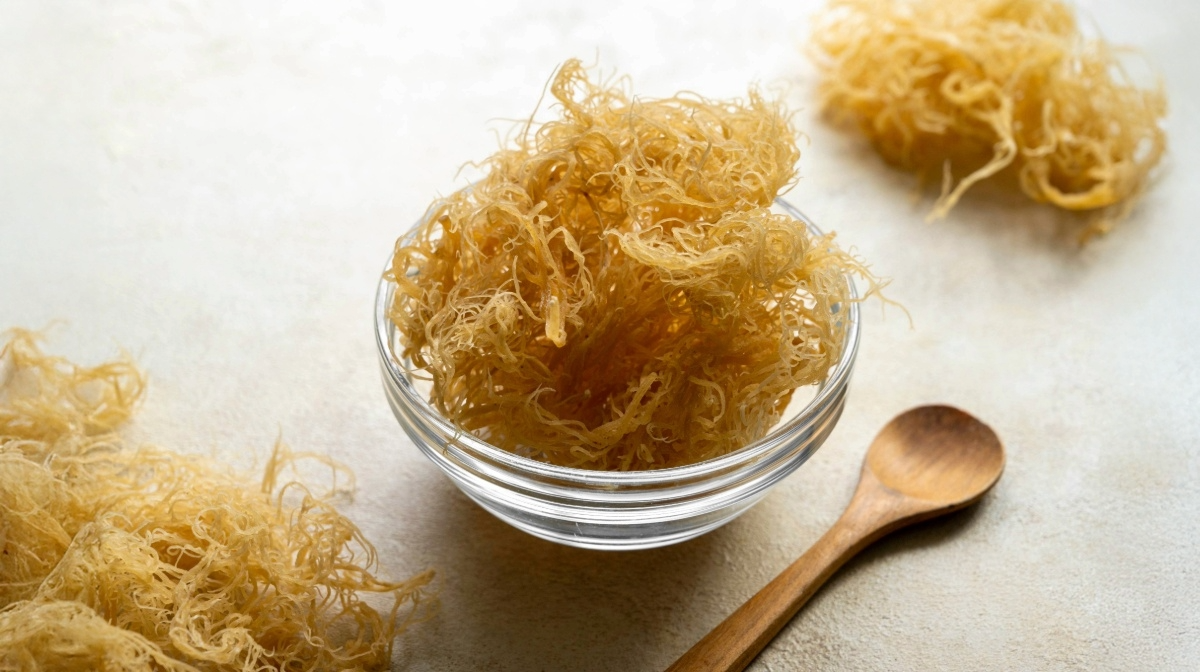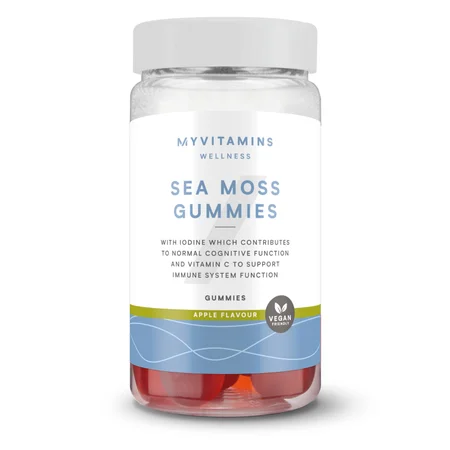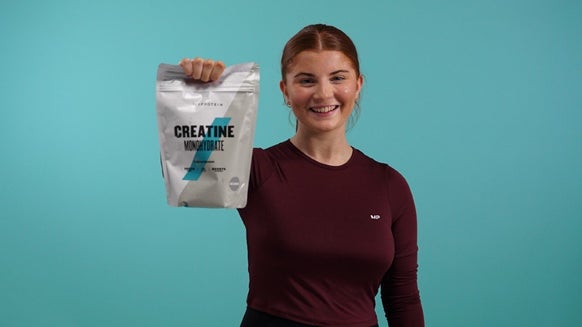Sea Moss: What It Is & Nutritional Benefits

You might have spotted sea moss, also known as Irish moss or Chondrus crispus, making waves across social media. Or perhaps you've heard whispers about it in your fitness circles.
This edible seaweed, a type of red algae, has been a staple in coastal communities for centuries. Especially in places like Ireland, where it was traditionally valued for its nutritional goodness.
Today, it's quickly gaining attention as a potential addition to a balanced, active lifestyle.
But what exactly is sea moss, and could it be a good fit for you?
- What’s Inside Sea Moss?
- The Potential Benefits of Sea Moss
- What to Expect When You Start Taking Sea Moss
- How to Incorporate Sea Moss into Your Routine
- Ways to Take Sea Moss
What’s Inside Sea Moss?
Sea moss is often celebrated as a nutrient-dense food, and for good reason ... it’s naturally rich in vitamins and minerals, which is why it's been a traditional staple for centuries.
It's important to approach some of the more ambitious claims with a balanced view. While it's sometimes stated to contain 92 out of the body’s 102 essential minerals, this is an oversimplification.
No single food provides every mineral the body needs, and the exact nutritional profile of sea moss can vary. This depends on where it’s harvested, the water quality, and how it’s processed. This is why choosing a quality sea moss supplement is so important.
However, sea moss can certainly contribute to your daily nutrient intake.
It's particularly notable for its iodine content, a mineral that contributes to the normal production of thyroid hormones and normal thyroid function.
Beyond that, it typically provides:
Magnesium: Contributes to normal muscle function, the normal functioning of the nervous system, and a reduction of tiredness and fatigue. Potassium: An electrolyte that contributes to normal muscle function and the maintenance of normal blood pressure. Iron: Contributes to normal oxygen transport in the body and a reduction of tiredness and fatigue. Calcium: Needed for the maintenance of normal bones and contributes to normal muscle function. B Vitamins: Such as riboflavin (B2) and folate (B9), which contribute to normal energy-yielding metabolism and normal blood formation respectively. Vitamin C: Contributes to the normal function of the immune system and the reduction of tiredness and fatigue. Trace Minerals: Including zinc, selenium, copper, and manganese, all contributing to various normal bodily functions, from the immune system to the protection of cells from oxidative stress. Omega-3 Fatty Acids: Though in smaller amounts compared to oily fish, sea moss contains some plant-based omega-3s, which contribute to the maintenance of normal brain function and normal vision. Amino Acids: The building blocks of protein, important for muscle repair and growth.
As a natural source of various elements, sea moss can be a valuable plant-based addition that supports your active lifestyle from the inside out.

The Potential Benefits of Sea Moss
When you’re pushing your body in the gym or out on the track, you’re always looking for ways to support your performance and recovery.
Sea moss offers several potential benefits that could make it a worthwhile addition to your diet. Let’s dive into these in detail.
Gut Health
A healthy gut contributes to your overall wellbeing and can influence your fitness progress.
Sea moss contains types of fibre that may act as prebiotics, feeding the beneficial bacteria in your gut. Think of them as fuel for your gut microbiome!
This fibre content can help support healthy digestion and may contribute to a balanced gut environment.
A well-functioning gut could mean better nutrient absorption from your food and supplements, which is vital for recovery and fuelling your workouts.
It may also contribute to a healthy immune system, as a significant portion of immune cells reside in the gut.
For those enduring demanding training regimes, supporting gut health could make a real difference in how your body processes fuel and recovers.
Contributes to Immune System Function
If you’re into fitness, you know that keeping your immune system strong is key to consistent training. Getting ill can derail your progress.
Sea moss provides various vitamins and minerals, such as vitamin C and zinc, which contribute to the normal function of the immune system.
Its natural compounds may also offer properties that contribute to the body's normal inflammatory response, which could help manage the body's reaction to intense exercise.
By contributing to normal inflammatory processes, sea moss may support overall recovery.
May Support Heart Health
Looking after your heart is paramount. Sea moss contains fibre and potassium.
Dietary fibre can help maintain normal cholesterol levels, and potassium contributes to the maintenance of normal blood pressure.
While the omega-3 content in sea moss isn't as high as in oily fish, these plant-based fatty acids are generally recognised as beneficial for normal heart function.
Incorporating nutrient-rich foods like sea moss can be one piece of the puzzle for a heart-healthy lifestyle.
Skin & Hair Wellbeing
The benefits of what you put into your body often show on the outside. Many people report improvements in their skin and hair when they regularly consume sea moss.
This isn't surprising, given its mineral and vitamin profile.
Minerals like zinc, magnesium, and vitamin C all contribute to the maintenance of normal skin. Zinc and selenium contribute to the maintenance of normal hair.
The gel-like consistency of sea moss, when prepared, also makes it a popular ingredient for topical applications, offering hydrating properties.
Weight Management
If you’re working towards a weight management goal, sea moss might offer some support.
It's important to be clear: sea moss isn’t a magic solution for weight management on its own. Weight management is complex and involves a combination of consistent effort, a balanced diet, and regular exercise.
However, the fibre content in sea moss can contribute to a feeling of fullness, which may help reduce overall calorie intake by curbing unhealthy snacking.
The fibre also supports healthy digestion and normal bowel movements.
Furthermore, as mentioned, the iodine in sea moss contributes to normal thyroid function, which plays a role in metabolism.
Some research also explores how certain seaweeds might affect nutrient absorption, though more studies are needed specifically on sea moss in humans regarding weight management.
Energy & Recovery for Your Workouts
For those engaged in demanding sports like weightlifting, bodybuilding, or endurance running, optimal energy and recovery are crucial.
Sea moss, with its spectrum of minerals and vitamins, can play a part in supporting these aspects of your fitness journey.
Intense exercise can deplete your body’s stores of electrolytes and minerals. Sea moss provides magnesium and potassium, which contribute to normal muscle function and the reduction of tiredness and fatigue.
The B vitamins contribute to your body’s normal energy-yielding metabolism, helping convert food into usable energy efficiently.
The compounds in sea moss that support the body's normal inflammatory response could also aid in post-workout recovery, helping to soothe muscles and contribute to a faster bounce-back for your next session.
Incorporating sea moss could be a way to ensure your body has the micronutrients it needs to perform and recover effectively.
What to Expect When You Start Taking Sea Moss
When you first begin taking sea moss, your body might go through an adjustment period.
Some people report feeling more energised, noticing improvements in their digestion, or seeing positive changes in their skin and hair fairly quickly.
Others might experience mild digestive upset as their body adapts to the new fibre and nutrients.
It’s important to remember that everyone reacts differently, and the effects aren't usually immediate or dramatic.
Sea moss is a whole food, and its benefits often build up over time with consistent use. Think of it as a gradual support for your wellbeing rather than a quick fix.
If you experience any significant discomfort or unusual symptoms, it’s always best to pause and seek advice from a healthcare professional.
How to Incorporate Sea Moss into Your Routine
If you’ve decided that sea moss could be a beneficial addition to your active lifestyle, understanding how to use it effectively is the next step.
There are several forms available, and different ways to consume it.
Forms of Sea Moss
Sea moss comes in a few different forms, each with its own advantages:
Raw Sea Moss: This is the natural, dried form of the seaweed. You’ll typically need to soak and blend it to make a gel for consumption. Sea Moss Gel: This is arguably the most popular way to consume sea moss. It’s made by blending soaked raw sea moss with water until it forms a smooth, gel-like consistency. You can buy pre-made gels from reputable suppliers. Sea Moss Powder: The raw seaweed is dried and ground into a powder. This can be easily added to drinks or food. Sea Moss Capsules/Gummies: For ultimate convenience, sea moss is also available in capsule or gummy form, often containing dried and powdered sea moss extract.
When considering "Is sea moss gel better than capsules?", it largely depends on your preference and goals.
Gel is often seen as being in a more natural form, offering versatility for culinary uses.
Capsules and gummies offer precise dosing and convenience, especially when travelling or if you don't enjoy the taste or texture of the gel.
Both can be effective, provided you choose a high-quality product.
Ways to Take Sea Moss
The gel form of sea moss is incredibly versatile, making it easy to incorporate into your daily routine:
Smoothies: This is perhaps the most common way. It blends seamlessly into fruit and vegetable smoothies, adding nutrients without significantly altering the taste. Soups and Stews: Add a spoonful to thicken and enrich the nutrient content of your favourite warm dishes. Its gel-like nature works as a natural thickener. Sauces and Dressings: Mix it into homemade salad dressings, gravies, or even yoghurt to boost its nutritional value. Teas and Hot Drinks: A small amount can be stirred into hot water with lemon and ginger for a simple wellness drink. Topical Use: You can also apply sea moss gel directly to your skin as a mask or to your hair, thanks to its hydrating properties.
The "healthiest" way to consume sea moss is subjective and depends on what works best for you and your preferences – the way you’ll stick to consistently, while adhering to sensible portion sizes and recommended doses.
As for what not to mix sea moss with, there aren't many specific contraindications regarding food combinations. Just be mindful of your overall iodine intake from other sources, like other seaweeds or iodised salt, to avoid getting too much.
You can absolutely take sea moss and omega-3 supplements together, as they offer complementary benefits.
Sea Moss Supplements: The Convenient Option
For those looking for a fuss-free way to incorporate sea moss into their daily routine, sea moss supplements like gummies or capsules are a fantastic option.
Our Sea Moss Gummies, for example, are packed with a 10:1 sea moss extract (equivalent to 350mg of raw sea moss per serving) and are also fortified with other key nutrients:
Vitamin C: Contributes to the reduction of tiredness and fatigue, and to normal energy-yielding metabolism. Vitamin D: Contributes to the normal function of the immune system and the maintenance of normal bones and normal muscle function. Iodine: As discussed, contributes to the normal production of thyroid hormones and normal thyroid function, as well as the normal functioning of the nervous system and normal cognitive function.
These delicious apple-flavour gummies offer a convenient way to top up on essential nutrients without the need for preparation. They're also suitable for vegetarians and vegans.
When choosing a supplement, always look for clear labelling, sourcing information, and ideally, third-party testing for purity. And, of course, always follow the recommended dosage on the product label.
Recommended Dosage
Because the nutrient content of sea moss can vary, especially its iodine levels, there isn't one universal recommended daily dosage for raw sea moss.
However, for supplements, always follow the recommended dosage on the product label. For our Sea Moss Gummies, we recommend 2 gummies daily.
If you incorporate sea moss daily, whether in whole food or supplement form, and adhere to a moderate intake, many people find it to be a beneficial daily addition.
However, consistent daily use without monitoring your iodine intake, or if sourced from an unreliable supplier, could potentially lead to issues, particularly with your thyroid.
It’s always best to start with the recommended dose, observe how your body reacts, and if you have any health conditions or are on medication, discuss your intake with a healthcare provider.
This is especially true for athletes who might be taking other supplements or have specific dietary needs.
Take Home Message
Sea moss offers a fantastic range of naturally occurring vitamins and minerals that can complement your active lifestyle.
From supporting your energy and metabolism to contributing to your immune system and general wellbeing, it's a versatile addition.
Whether you opt for raw sea moss gel or the convenience of supplements like our Sea Moss Gummies, remember that quality sourcing and sensible, recommended dosing are key.
Always listen to your body, and when in doubt, consult a healthcare professional to ensure sea moss is the right fit for you.









